|
Base
Life
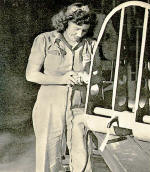 [The
WACs] did a lot of work, mostly in office work and things like that. Of
course, they did a lot of work in the hospital area. There were some in
the motor pool. There were a lot of them in headquarters. I suppose they
were scattered pretty well all over the field. They were
greatly respected. And they were a cracker-jack bunch. [The
WACs] did a lot of work, mostly in office work and things like that. Of
course, they did a lot of work in the hospital area. There were some in
the motor pool. There were a lot of them in headquarters. I suppose they
were scattered pretty well all over the field. They were
greatly respected. And they were a cracker-jack bunch.
 I mean they
turned out, and they were very smart in their uniforms and all of their
formations were first class.” Bill Teague (1942-1945) I mean they
turned out, and they were very smart in their uniforms and all of their
formations were first class.” Bill Teague (1942-1945)
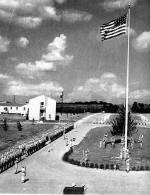 “In the
evening they’d lower the flag in front of headquarters. They’d play
taps, and they’d lower the flag. I was on detail one summer, and it was
July or August; it was really hot. We marched up there and went to
parade rest. It was on asphalt and you couldn’t look down. When I put
my foot out, I put my foot right in some asphalt that was fluid, and
then, when they called us to attention, I couldn’t get my leg to move;
it was stuck to the ground.” George Kerns (1957-1960) “In the
evening they’d lower the flag in front of headquarters. They’d play
taps, and they’d lower the flag. I was on detail one summer, and it was
July or August; it was really hot. We marched up there and went to
parade rest. It was on asphalt and you couldn’t look down. When I put
my foot out, I put my foot right in some asphalt that was fluid, and
then, when they called us to attention, I couldn’t get my leg to move;
it was stuck to the ground.” George Kerns (1957-1960)
 “Well,
the band was a party group if I ever saw it. They had two orderly
rooms. One was to conduct the business of the band, and the other was a
rehearsal room and a place to conduct the social activities. After they
would finish playing Retreat in the afternoon, they’d march back, and
we’d all hightail it down to the band—at least those of us who were in
the know. You’d go into the restroom, and you’d find celery and carrots
curling in the lavatory, and you’d open up a footlocker, and you’d have
whole trays of hors d’oeuvres in there that someone cooked up. They
used to have what was called the Interurban between Denison and Dallas.
Once a week, somebody took an empty suitcase and went to Dallas and
filled it up with booze, and smuggled it back on to the base. So, after
Retreat every day, we had a splendid happy hour.” Bill Teague
(1942-1945) “Well,
the band was a party group if I ever saw it. They had two orderly
rooms. One was to conduct the business of the band, and the other was a
rehearsal room and a place to conduct the social activities. After they
would finish playing Retreat in the afternoon, they’d march back, and
we’d all hightail it down to the band—at least those of us who were in
the know. You’d go into the restroom, and you’d find celery and carrots
curling in the lavatory, and you’d open up a footlocker, and you’d have
whole trays of hors d’oeuvres in there that someone cooked up. They
used to have what was called the Interurban between Denison and Dallas.
Once a week, somebody took an empty suitcase and went to Dallas and
filled it up with booze, and smuggled it back on to the base. So, after
Retreat every day, we had a splendid happy hour.” Bill Teague
(1942-1945)
 “I
was on [the exhibition] drill team, and we did real fancy formations.
We did all sorts of special exhibitions. Everything was done
rhythmically. Being a musician, I found that was very easy. Some of
them had a terrible time knowing their right foot from the left foot,
but I did know the difference, and I could follow instructions. All the
turns, all the stops, and everything else was all rhythm, and once you
got into the rhythm of it, it was a lot of fun. It was almost line
dancing.” Bill Teague (1942-1945) “I
was on [the exhibition] drill team, and we did real fancy formations.
We did all sorts of special exhibitions. Everything was done
rhythmically. Being a musician, I found that was very easy. Some of
them had a terrible time knowing their right foot from the left foot,
but I did know the difference, and I could follow instructions. All the
turns, all the stops, and everything else was all rhythm, and once you
got into the rhythm of it, it was a lot of fun. It was almost line
dancing.” Bill Teague (1942-1945)
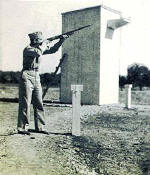 “We
all had to be qualified through this rifle business, and I had never
shot a gun in my life. They took us down to the rifle range. They had
the officers in charge and people out by the targets, and they’d yell,
“Mark the targets,” and they’d show you where the shots had gone. When
it came time to mark my target, they kept yelling, “Mark the target,”
and nothing would happen. I had to qualify; it was required that I
qualify. So, about a week later, they took me back to the rifle range.
They put up one target. They took my glasses off and put a cover over
my eye and gave me a rifle with a telescopic sight and said, ‘Now,
shoot.’ I missed the target and killed a cow. There was a farmer out
there, and I killed his cow. And everybody, of course, knew about it.
So they had a great ceremony when I got my medal as a marksman expert.
And then, when they got through, they said, ‘He also has to qualify on
the machine gun.’ And the officer said, ‘Give me that thing; I’ll sign
it right now. Don’t dare give him a machine gun!” So, I’m an expert;
I’ve never fired one in my life. We had our moments.” Bill Teague
(1942-1945) “We
all had to be qualified through this rifle business, and I had never
shot a gun in my life. They took us down to the rifle range. They had
the officers in charge and people out by the targets, and they’d yell,
“Mark the targets,” and they’d show you where the shots had gone. When
it came time to mark my target, they kept yelling, “Mark the target,”
and nothing would happen. I had to qualify; it was required that I
qualify. So, about a week later, they took me back to the rifle range.
They put up one target. They took my glasses off and put a cover over
my eye and gave me a rifle with a telescopic sight and said, ‘Now,
shoot.’ I missed the target and killed a cow. There was a farmer out
there, and I killed his cow. And everybody, of course, knew about it.
So they had a great ceremony when I got my medal as a marksman expert.
And then, when they got through, they said, ‘He also has to qualify on
the machine gun.’ And the officer said, ‘Give me that thing; I’ll sign
it right now. Don’t dare give him a machine gun!” So, I’m an expert;
I’ve never fired one in my life. We had our moments.” Bill Teague
(1942-1945)
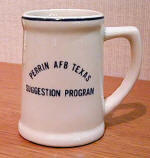 “I made
some pretty good money off the Air Force on the suggestions, because
that went Air Force-wide. The regulations read that if you’ve got a
suggestion, and another base uses the suggestion, they have to pay you,
too.” Morris Guzick (1941-1946; 1948-1971) “I made
some pretty good money off the Air Force on the suggestions, because
that went Air Force-wide. The regulations read that if you’ve got a
suggestion, and another base uses the suggestion, they have to pay you,
too.” Morris Guzick (1941-1946; 1948-1971)
“We had a really very good mess sergeant there. He had
a rule that what you put on your tray, you ate, if it took you all day.
He said that he wanted to pride himself on no garbage. So, we learned
very quickly not to take more than we needed. We could have anything we
wanted that was there and as much as we wanted, but what we took, we
ate. It was just a great big open dining room. I don’t know how many
tables were in there.” Bill Teague (1942-1945)
“They had an officers’ mess hall, and it was a
masonry-style building. The food was good in the officers’ unit. Having
been a GI at one time, we always complained about the food, but the food
was good; it was wholesome, and it was clean. We had some very good old
master sergeant cooks who did their best to provide the best.” Col.
B. J. Long (1950-1962)
 “I
don’t know whether they had a [baseball] team in 1942 or not. I didn’t
get there until the later part of 1942. But I know in 1943 and 1944 we
did, and I assume it stayed on after that. All the base squadrons
[participated], even the aviation cadets and the maintenance squadrons,
all of the support squadrons, the air police and the medics, so it was a
pretty good sized tournament.” Loyd Upchurch (1942-1944). “I
don’t know whether they had a [baseball] team in 1942 or not. I didn’t
get there until the later part of 1942. But I know in 1943 and 1944 we
did, and I assume it stayed on after that. All the base squadrons
[participated], even the aviation cadets and the maintenance squadrons,
all of the support squadrons, the air police and the medics, so it was a
pretty good sized tournament.” Loyd Upchurch (1942-1944).
 “That
first year I don’t remember ever seeing them play baseball, because
everything was gung-ho with the war just started. I do know that later
the squadrons had baseball teams, and in the gym the squadrons had
basketball games . . .” Morris Guzick (1941-1946; 1948-1971) “That
first year I don’t remember ever seeing them play baseball, because
everything was gung-ho with the war just started. I do know that later
the squadrons had baseball teams, and in the gym the squadrons had
basketball games . . .” Morris Guzick (1941-1946; 1948-1971)
 “Out
at Lake Texoma they had a camp that had cabins where you could go out
and spend some time in the cabins if you wanted to.” George Kerns
(1957-1960) “Out
at Lake Texoma they had a camp that had cabins where you could go out
and spend some time in the cabins if you wanted to.” George Kerns
(1957-1960)
“They
wanted to have this new swimming pool ready for a visit from [Sam
Rayburn]. We had one swimming pool. That was for the enlisted men, but
we were building a new one for the officers.
 They would make us go down
there and work on the swimming pool instead of doing our physical
training. They had a plank going down to the bottom, and I had the last
load of cement. My wheelbarrow got away from me and fell off in the
floor, and I fell off also. Ruined the bottom of the pool. They had to
completely redo it. And so, the officer decided he wasn’t going to have
me do that anymore.” Bill Teague (1942-1945) They would make us go down
there and work on the swimming pool instead of doing our physical
training. They had a plank going down to the bottom, and I had the last
load of cement. My wheelbarrow got away from me and fell off in the
floor, and I fell off also. Ruined the bottom of the pool. They had to
completely redo it. And so, the officer decided he wasn’t going to have
me do that anymore.” Bill Teague (1942-1945)
 “When old
Sam Rayburn came, we had a big thing, and they made us all come down
there for a swim contest. Fortunately, I’m a good swimmer. Poor old
Jack just sinks like a rock. We were ready to go into town for the
evening when our sergeant said, ‘No, you’re in the swimming tournament.
Go now.’ So, we had to compete in the tournament. Well, I won my part.
Jack practically drowned. They had to pull him out. He fell off the
diving board and scraped his leg. He couldn’t get out of the pool. It
was a roaring success, and Sam Rayburn loved the whole thing.” Bill
Teague (1942-1945) “When old
Sam Rayburn came, we had a big thing, and they made us all come down
there for a swim contest. Fortunately, I’m a good swimmer. Poor old
Jack just sinks like a rock. We were ready to go into town for the
evening when our sergeant said, ‘No, you’re in the swimming tournament.
Go now.’ So, we had to compete in the tournament. Well, I won my part.
Jack practically drowned. They had to pull him out. He fell off the
diving board and scraped his leg. He couldn’t get out of the pool. It
was a roaring success, and Sam Rayburn loved the whole thing.” Bill
Teague (1942-1945)
“We had all the big shots fly into Perrin for [Sam] Rayburn’s funeral
in Bonham, Texas. I ran the dispatch section that day, and we had
Kennedy; we had Kennedy and Air Force One there;
we had Harry Truman; we had
Eisenhower.
That day we had all those people from the House of Representatives,
the Senate, it was a rare day in history that you’d have the whole
Washington bunch down to a little old place like Perrin and Grayson
County and Fannin County.” James
McCall (1951, 1956-1971).
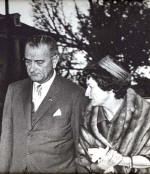
Perrin and the Community
 |
